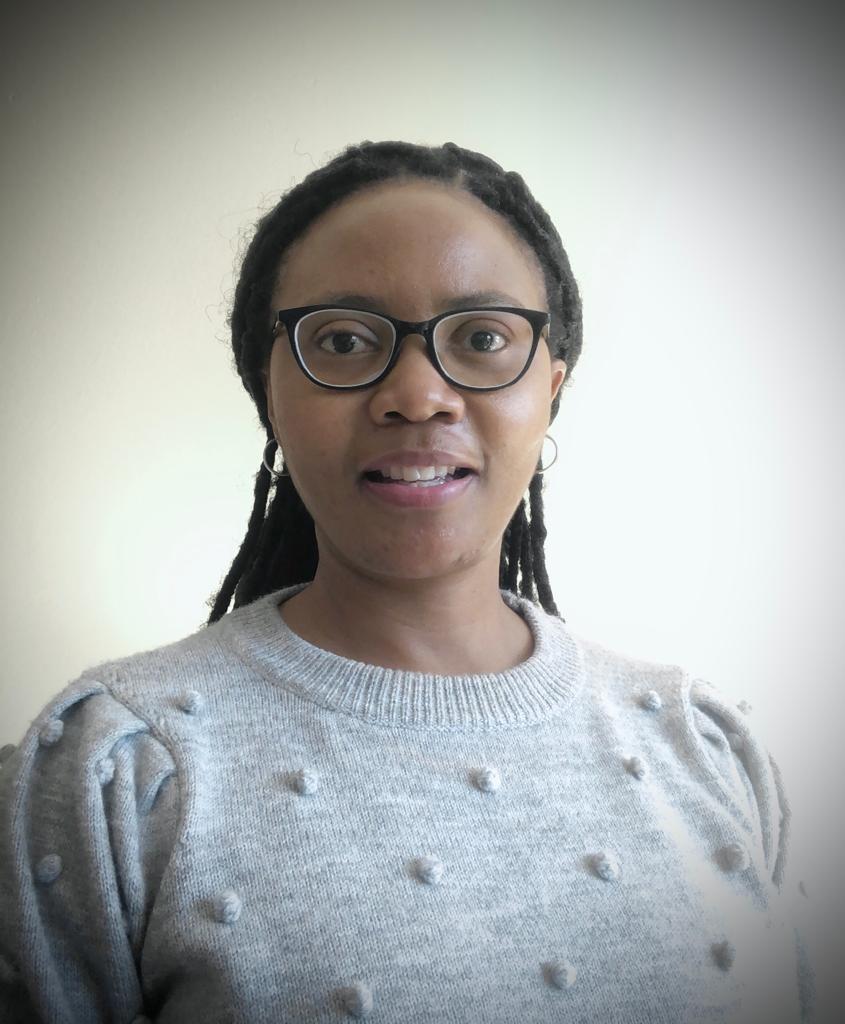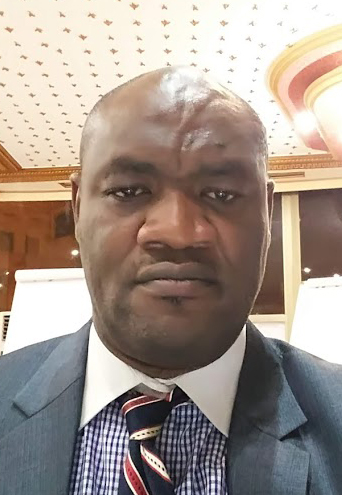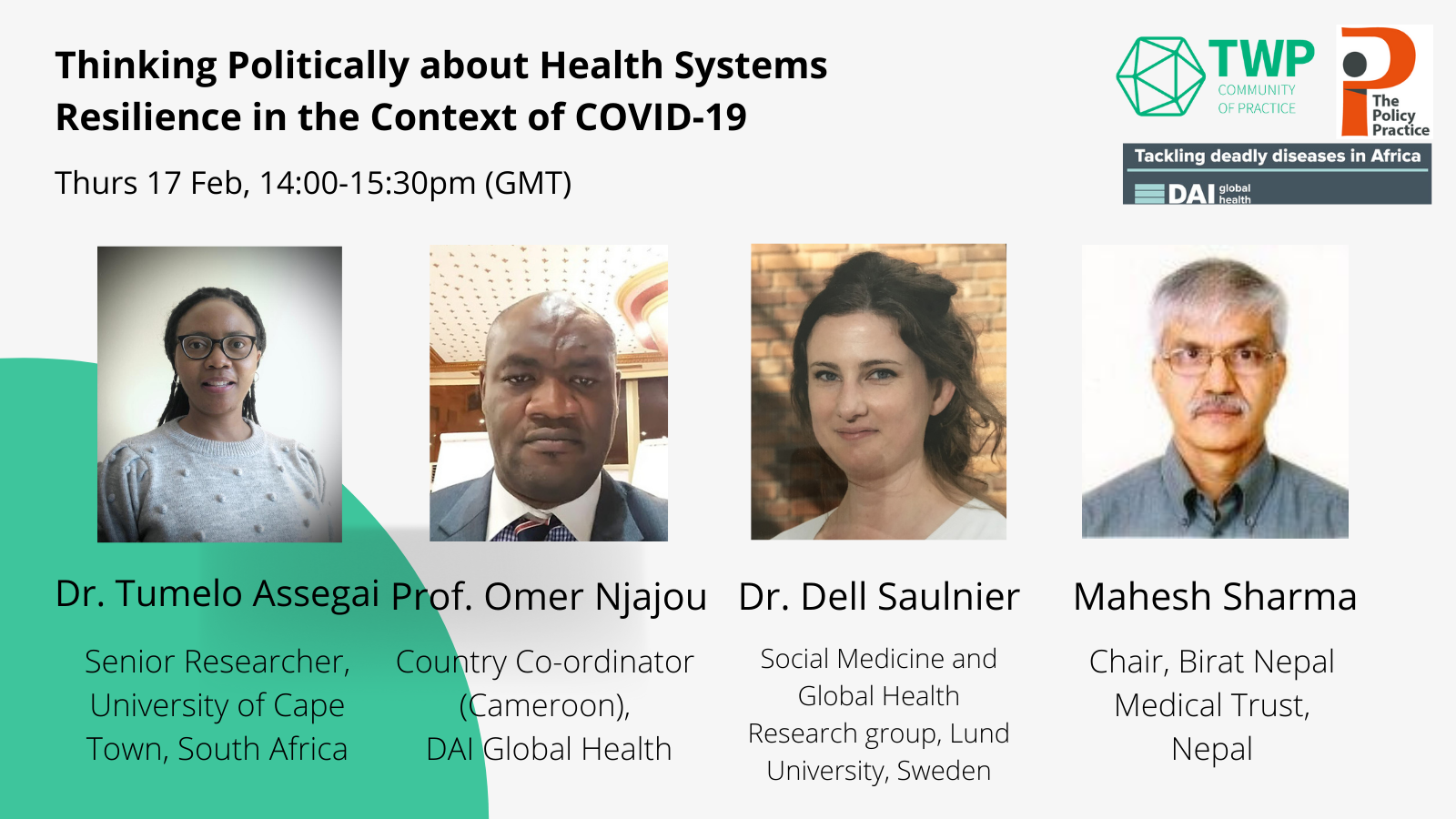Thursday 17 February 14:00-15:30pm (GMT): Thinking Politically about health systems resilience in the context of COVID-19
In collaboration with The Policy Practice, and DAI Global Health.
This event has ended. Please watch the recording now, or read our reflection note.
COVID-19 has tested the resilience of health systems and their ability to prepare for, respond to, cope with and adapt to crises. Focusing on the experiences of three countries: Cameroon, Nepal and South Africa, this webinar examined how the resilience of health systems has been shaped by political and institutional processes, and how the national and international response to COVID-19 has itself affected resilience. The discussion highlighted which factors have mattered most in different contexts and will help to set the agenda for future research in this area, including in the run-up to the 7th Global Symposium on Health Systems Research (HSR 2022), whose theme this year is ‘health systems performance in the political agenda.’
About the Speakers:

Dr. Tumelo Assegai; Senior Researcher, University of Cape Town
Tumelo Assegaai works at the University of Cape Town as a senior researcher. She holds a PhD in public health from the University of the Western Cape. Her key area of interest is health systems strengthening with special focus on community health and community health workers. Prior to this she spent well over 7 years at Health Systems Trust (HST) as a Technical Advisor. At HST she worked on various projects that provided the Department of Health, in various provinces, with support in health system strengthening on Monitoring and Evaluation, strategic planning and community health services.
Contact: mampetumelo@yahoo.com

Prof. Omer Njajou; Country Co-ordinator (Cameroon) for DAI-Tackling Deadly Diseases in Africa (TDDA) Project
Formerly at the University of California San Francisco, USA, and at the Université des Montagnes in Cameroon, where I headed the Public Health & Epidemiology Unit. I lead projects, in community health, one health, epidemiology, infectious/emerging diseases and public health policies and strategies. I was the Senior Technical Advisor and Country Coordinator Francophone Africa on the USAID-One Health Workforce Project with the University of Minnesota and later on Country Coordinator (Cameroon) for the Tackling Deadly Diseases in Africa (TDDAP) with DAI Global Health. I am currently the Technical Lead in charge of International Health Regulation and One Health with TDDA/DAI-global health.
Contact: omer_njajou@dai-tddap.org

Dr. Dell Saulnier; Social Medicine and Global Health Research group, Lund University, Sweden
Dr. Dell Saulnier is a postdoctoral fellow in the Social Medicine and Global Health Research group at Lund University in Sweden and affiliated to the Centre for Research on Healthcare in Disasters at Karolinska Institutet in Sweden. Her research area is health system resilience, with a focus on governance for resilience, the role of the private health sector in supporting resilience, and on resilience to disasters in low- and middle-income countries. She is also the co-leader of the European hub of the Systems Thinking Accelerator network, a WHO Alliance for Health Policy and Systems Research global initiative to support the application of systems thinking for health.
Contact: dell.saulnier@med.lu.se

Mr. Mahesh Sharma; Chair, Birat Nepal Medical Trust, Nepal
Mahesh has more than twenty years of experience in programme development and management including policy development and policy analysis in the area of health, HIV/AIDS, TB (inducing National Strategy Application for GFATM), and community development. He has written a number of successful national proposals to the Global Fund for HIV/AIDS and TB. Prepared national HIV/AIDS strategy and costed work plans. Worked for the Government, and other organisations in countries (Bangladesh, India, Pakistan, Bhutan, Vietnam, UNAIDS Regional support team at Bangkok, Solomon Islands). Has carried out number of evaluations, assessments (including National AIDS Spending Assessment – NASA) and health programme reviews. He has developed National HIV and AIDS Strategies, Health Strategy and organisational strategies for national organisations. He is actively involved in various civil society organisations and has represented in national institutions in various capacity i.e. Board member in Govt. HIV/AIDS and STI Control Board (2008 – 2010), CCM technical subcommittee members (2005 – 2008) and member in oversight committee (Jan – July 2012) including technical review panel and peer reviewers, and BNMT/UK Board of Trustees (2006 – 2010).
Contact: shreemahesh.sharma@gmail.com
Chair:

Gareth Williams, Executive Director, The Policy Practice
Gareth Williams is a Director of The Policy Practice with a varied background in development consulting work. Over the past ten years he has been heavily engaged in developing and applying political economy approaches to development and governance problems. Recent assignments include sectoral political economy analyses for a large agribusiness project in Nigeria, agricultural value chains in the Niger Delta, anticorruption in Sierra Leone, public financial management in DRC and trade policy in Nigeria. He has conducted country level political economy analyses in Kenya, Yemen, Ghana and Zambia, as well a country governance assessment in Rwanda. He also specialises in the design and monitoring of empowerment and accountability programmes, and is the lead evaluator for annual reviews of the DFID State Accountability and Voice programme in Nigeria.
Event Summary:
Throughout the COVID-29 pandemic, the resilience of health systems has been severely tested in nearly every country throughout the world, with a variety of contextual political, social, and cultural factors shaping the ways they operate and their ability to prepare for, respond to, and cope with the crisis while continuing to provide basic services in equitable ways. This event, convened by the Thinking and Working Politically Community of Practice and The Policy Practice, sought to identify some of the critical explanatory factors and priorities for action, focusing on the varied experiences of Nepal, Cameroon, and South Africa.
The discussion highlighted the immense breadth of responses across these countries. In Nepal, Mr Mahesh Sharma, Chair of Birat Nepal Medical Trust, Nepal, emphasised that factors including the rapid establishment of emergency response teams, an effective vaccine roll-out, and the role of municipal and local level authorities had all been important in the response to the pandemic. However, recent decentralisation reforms have also disrupted previously understood arrangements for crisis management, leading to confusion, weak coordination, and ad hoc responses. The problem has been compounded by procurement issues and cumbersome rules and regulations.
From Cameroon, Prof. Njajou, Country Co-ordinator (Cameroon) for DAI-Tackling Deadly diseases in Africa (TDDA) Project, highlighted some positive aspects of resilience, such as strong disease surveillance systems that were developed during the Ebola outbreak. However, he observed that the COVID-19 response had led the government to establish new, centrally managed emergency systems that by-pass existing health security structures. This has led to a lack of multi-sectoral coordination, and the prioritisation of COVID-19 at the expense of other public health challenges. Prof. Njajou also noted the changing pressures with different waves of the pandemic, and the negative toll the pandemic has had on health workers, who have been highly exposed to infection risks.
From South Africa, Dr. Tumelo Assegai, Senior Researcher, University of Cape Town, praised the government’s quick response to activating emergency plans, such as the emergency operating centres and National Institute for Communicable Disease, allowing for world class tracking of COVID-19 and the early detection of new variants. She also highlighted the benefit of using the country’s extensive network of community health care workers used to treat HIV/AIDS to screen high-risk communities for COVID, as well as the involvement of civil society organisations (CSOs) in the response. Yet weaknesses have also emerged; especially relating to corruption in procurement and the inequities that the pandemic has exposed in the South African healthcare system.
Throughout the discussion, a series of cross-cutting themes emerged as crucial determinants of resilience. The first centred on the importance of citizens’ trust in government and the perceived legitimacy of public health measures. Panellists raised concerns that mistrust towards government has contributed to vaccine hesitancy and undermined adherence to public health measures. They suggested that trust has been undermined by corruption in COVID-19 procurement contracts, active attempts at misinformation, as well as the general perception that public health policies are being shaped more by political than scientific and evidence-based considerations.
These experiences help to show that decisions regarding public health often become politicised regardless of scientific validity, with wider implications on the health sector and the nature and quality of the linkages between state and society. The panellists emphasised that understanding the decision-making process linked to the COVID-19 response and advocating for greater transparency is therefore essential to improving pandemic response and the overall resilience of the health system. This includes encouraging civil society to become more active in decision making and monitoring processes linked to the COVID-19 response.
A second key theme that emerged in determining resilience focused on the flexibility of health systems to learn and adapt. This is particularly important given the multiple waves of COVID-19, and how during each phase governments have had to respond to different challenges and constraints. What worked in the first wave may not necessarily work in subsequent ones. How a system can effectively learn and adapt to uncertainty is therefore crucial to resilience.
While each of the three countries showed different degrees of resilience, with some elements of the health system responding relatively well and others less so, the discussion highlighted that there is no one size fits all approach to promoting resilience, and that a context specific approach is crucial. Moreover, there is still very limited empirical knowledge about what strategies have proven more/less effective in building long-term resilience in different contexts. This event began to explore what is an enormous – and enormously complex topic, emphasising the importance of looking at the COVID-19 response through a politically informed lens, and of sharing lessons between countries.
It is well worth watching the full recording of the event, and please do look out for Gareth Williams’ forthcoming policy brief, which will build on the points made in this summary. Finally, if this is a topic you are interested in, make sure you tune in to the Global Symposium on Health Systems Research taking place in November this year, which will focus on the theme of “Health Systems Performance in the Political Agenda.”

